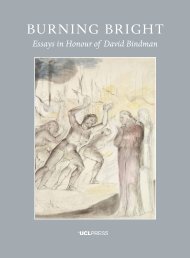Archives
TiL0x
TiL0x
Create successful ePaper yourself
Turn your PDF publications into a flip-book with our unique Google optimized e-Paper software.
First, Constantijn orchestrates – literally ventriloquises – the<br />
giving of token gifts to his English hostess by Dorothea, carefully<br />
crafting the approach as the courtly gesture, or ‘paying court’ it is<br />
intended to be. Perhaps he salves his conscience by explicitly involving<br />
Dorothea in his London life, perhaps he persuades himself that he is<br />
thereby offering her a golden opportunity to ‘come up’ in the world,<br />
by putting her in a position to enter Lady Killigrew’s household<br />
herself. Eager to please, as always, Dorothea obliges by transcribing<br />
his letter creating her as a gracious English courtier, and ascribing it<br />
to herself.<br />
Lady Killigrew evidently replied (as she would be required to<br />
do out of pure politesse), and in doing so implied that she had been<br />
informed that Dorothea was not in any way attached to Constantijn,<br />
was, indeed, spoken for elsewhere. Now Constantijn is required to<br />
repair the damage done at both ends of his carefully engineered correspondence<br />
between rivals for his affection. The result is the second<br />
letter. Once again the genuinely aggrieved Dorothea obligingly goes<br />
along with the fiction that this had been, at worst, a misunderstanding.<br />
But she makes it extremely clear that whatever claims she has on<br />
Constantijn persist:<br />
I dare say he doth long to see thinges brought to such an ende<br />
as he hath bene pleased to imagine, afore nor I nor anie liuing<br />
sowle thought of it. [But] the truth is, I do liue quietlie in the same<br />
estate, he left me and found me at his going and coming from<br />
England: neither do I see anie reason why I should wish to alter<br />
it. . . . The willing friendshipp I contracted w[ith] him euen almost<br />
from his childhood is such as no alteration will be able to alter it<br />
no, not this very unciuill doing of his.<br />
***<br />
If this seems a far-fetched interpretation (it is, by the way, the only one<br />
I am satisfied by which makes sense of all the data), let us turn, finally,<br />
to the last letters we have that Constantijn sent to Dorothea, in 1626. By<br />
this time, as numerous poems to ‘sterre’ or Susanna van Baerle, written<br />
during the same period, make clear, Constantijn had committed himself<br />
to the woman who would become his wife in April 1627.<br />
In April 1626, Constantijn wrote two letters to Dorothea, dated<br />
close together, or perhaps even on the same day. They are written in<br />
response to a report (received by Huygens via her brother, perhaps<br />
with strong accompanying protest) that there has been a violent<br />
80 TEMPTATION IN THE ARCHIVES





